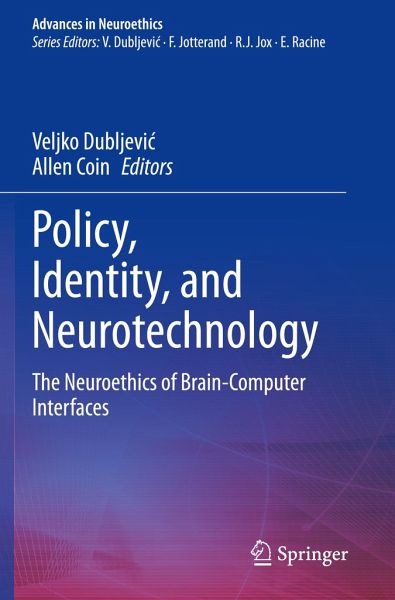
Policy, Identity, and Neurotechnology
The Neuroethics of Brain-Computer Interfaces
Herausgegeben: Dubljevic, Veljko; Coin, Allen
Versandkostenfrei!
Versandfertig in 1-2 Wochen
82,99 €
inkl. MwSt.

PAYBACK Punkte
41 °P sammeln!
In this volume the authors explore the landscape of thought on the ethical and policy implications of Brain Computer Interface (BCI) technology. BCI technology is a promising and rapidly advancing research area. Recent developments in the technology, based on animal and human studies, allow for the restoration and potential augmentation of faculties of perception and physical movement, and even the transfer of information between brains. Brain activity can be interpreted through both invasive and non-invasive monitoring devices, allowing for novel, therapeutic solutions for individuals with di...
In this volume the authors explore the landscape of thought on the ethical and policy implications of Brain Computer Interface (BCI) technology. BCI technology is a promising and rapidly advancing research area. Recent developments in the technology, based on animal and human studies, allow for the restoration and potential augmentation of faculties of perception and physical movement, and even the transfer of information between brains. Brain activity can be interpreted through both invasive and non-invasive monitoring devices, allowing for novel, therapeutic solutions for individuals with disabilities and for other non-medical applications. However, a number of ethical and policy issues have been identified from the use of BCI technology, with the potential for near-future advancements in the technology to raise unique new ethical and policy questions that society has never grappled with before.
The volume has three parts: 1) Past, Present and Future of BCI technology, 2) Ethical and Philosophical Issues and 3) Legal and Policy Implications. The rich and detailed picture of the field of BCI ethics with contributors from various fields and backgrounds, from academia and from the commercial sphere may serve as an introductory textbook into the neuroethics of BCI, or as a resource for neuroscientists, engineers, and medical practitioners to gain additional insight into the ethical and policy implications of their work.
The volume has three parts: 1) Past, Present and Future of BCI technology, 2) Ethical and Philosophical Issues and 3) Legal and Policy Implications. The rich and detailed picture of the field of BCI ethics with contributors from various fields and backgrounds, from academia and from the commercial sphere may serve as an introductory textbook into the neuroethics of BCI, or as a resource for neuroscientists, engineers, and medical practitioners to gain additional insight into the ethical and policy implications of their work.












